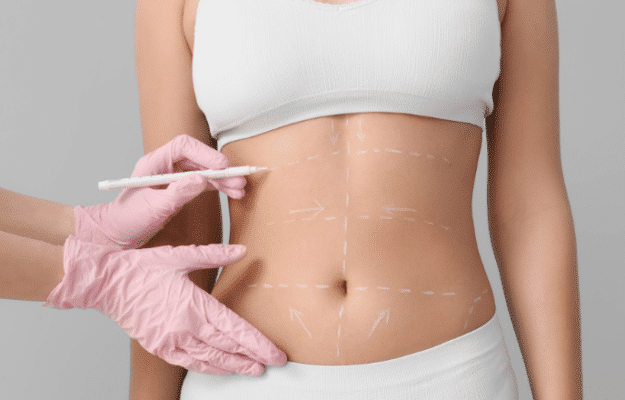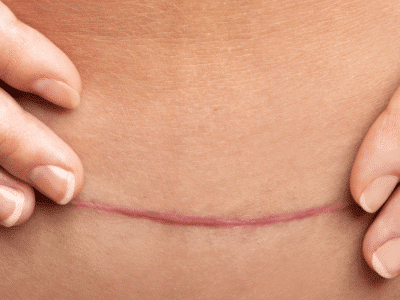Post Bariatric Body Contouring After Weight Loss in London

It is never easy to lose a substantial amount of weight, and those who succeed should be applauded for their hard work and dedication. Whether significant weight loss is achieved through diet and exercise or with weight loss surgery, the satisfaction of achieving dramatic loss can contribute significantly to an overall improvement in both physical and mental health. However, many may have achieved that long-awaited goal of the final target weight only to be left with a significant amount of loose skin, which may cause medical problems in itself as well as contribute to a loss of self-confidence. Fortunately, there is an excellent solution in the form of post-bariatric body contouring surgery to get rid of excess skin. Major weight loss can lead to loose and flabby skin affecting the abdomen, upper arms, breasts, buttocks and thighs. This can lead to a deflated appearance with unsightly bulges and areas of loose and hanging skin.
RELATED: Excess Skin Removal Surgery
Once the skin has been stretched out by significant weight gain, subsequent weight loss results in excess skin that does not return to its normal level of elasticity. Skin elasticity is related to genetics and the natural ageing process and tends to lose its tightness over time. Once the skin begins to lose elasticity, it cannot support the underlying subcutaneous fat. This can result in the stretching of the deeper tissues, which results in an untoned appearance. Areas of excess fat may persist in stubborn areas despite significant weight loss, which can produce unsightly bulging and unevenness, leading to adverse effects on overall body contour. There are several different types of post-bariatric body contouring procedures that are designed to address these common issues experienced after weight loss. These procedures allow people to achieve a sculpted and defined figure so that they can enjoy the full effects of successful weight loss.
What is body contouring after weight loss?
Body contouring after massive weight loss comprises several different procedures, which all have as their common aim, the elimination of excess skin and fat with tightening of the soft tissues to achieve a sculpted, defined and firmer-looking body. Body contouring procedures after weight loss include:
Tummy tuck
A tummy tuck, also known as abdominoplasty surgery, is designed to produce a flat stomach by removing loose skin and excess fat and tightening the abdominal muscles.
Breast lift
Breast lift surgery, also known as mastopexy, is aimed at correcting sagging or drooping breasts to achieve a perkier and more youthful appearance. A breast lift is often combined with breast implants to improve both shape and size in the same procedure.
RELATED: How to get rid of sagging breasts after weight loss
Arm lift
Arm lift, or brachioplasty surgery can achieve firmer and tighter arms with the removal of excess skin and fat.
Thigh lift
A thigh lift or inner thigh lift can significantly improve the shape of the thighs by surgically removing saggy skin.
Buttock lift
People who develop saggy buttocks after weight loss can achieve firmer and contoured buttocks by removing loose skin and excess fat as part of a buttock lift. The shape of the buttocks can be further improved with fat transfer, also known as a Brazilian butt lift or BBL.
Facelift (rhytidectomy)
Although a facelift is designed to address signs of facial ageing such as lines, wrinkles, and loose skin, many people may not be so familiar with facelift surgery, which is able to improve gaunt-looking or sunken faces caused by weight loss.
RELATED: How are the face and neck affected by dramatic weight loss?
The most appropriate procedure or combination of procedures will be recommended after a thorough clinical assessment, during which your needs and desires will be carefully considered. Your surgeon will be able to tell you what is realistically achievable with body contouring surgery after weight loss. You will also be given an idea of what to expect in the recovery period. In many cases, it may be suggested that surgery be performed in a staged manner to minimise risks.
Benefits of Getting Body Contouring Procedures in London
Here are some of the key benefits you could enjoy:
Treat Several Areas in One Go
If you’ve lost a lot of weight and are left with sagging skin, body shaping surgery can help you tackle multiple problem areas all in a single session. It’s a convenient option for those who want to address various issues without multiple surgeries.
Move Around More Comfortably
Removing extra skin can make your life more comfortable in many ways. You’ll find it easier to move around, exercise, and just go about your daily activities without the annoyances like chafing, tugging, added weight, or anything else that makes you feel uncomfortable.
A Trusted and Safe Method
As long as you choose a qualified surgeon, body shaping surgery after massive weight loss is a safe and reliable way to improve your appearance. Our team of surgeons are dedicated to ensuring you get the best possible outcome. If you’re worried about the risks, you can learn more about them on our website.
Results That Last
Once you’ve had body shaping surgery after significant weight loss, the results are usually permanent. That means as long as you stay at a healthy weight following the surgery, you can enjoy the benefits for the long term.
What can be achieved with post bariatric surgery after massive weight loss?
We recently had a patient at Centre for Surgery who managed to achieve an incredible 60 kg weight loss after diligently following a sensible program of healthy eating and regular exercise. After 18 months of being fully committed to achieving a goal of sustained and permanent weight loss, she finally achieved a slimmer figure and no longer experienced hip, knee or back pain.
RELATED: Can diet and exercise get the same results as cosmetic surgery?
Despite losing so much weight, excess skin became a problem and prevented her from enjoying the results of her significant weight loss. Sadly, as with many people who accomplish significant weight loss after diet and exercise or weight loss surgery, excess skin often becomes a significant everyday problem. Loose skin can cause skin irritation, inflammatory changes and body odour problems. This can cause people to withdraw from many common social situations, leading to a loss of self-confidence. Many people may be unable to maintain incredible weight loss due to developing a negative self-image.
Compared with subcutaneous fat, once significant weight loss has occurred, the skin does not return to its normal level of elasticity. Diet and exercise cannot improve loose skin. The only way to get rid of loose skin is with excess skin removal surgery. To learn more about post-bariatric body contouring after weight loss and view before and after photos of post-weight loss surgery, get in touch with us today to schedule an in-person consultation at our Baker Street clinic.
What does post weight loss surgery involve?
There are several different types of post-bariatric body contouring procedures depending on the area of the body to be targeted. All procedures aim to remove loose skin while tightening the underlying soft tissues. In some cases, liposuction may be carried out to eliminate residual areas of excess fat. If you want to learn more about the individual procedures, please view our post-weight loss surgery section. In all cases, your surgeon carefully positions incisions in natural skin creases and body folds to hide them as much as possible.
Body contouring after weight loss at Centre for Surgery
Most post-weight loss surgical procedures occur at our state-of-the-art Baker Street clinic in central London. The Care Quality Commission (CQC) regulates our Baker Street clinic and we adhere to the highest standards of medical care to ensure your procedure proceeds as smoothly as possible.
Where several body contouring procedures are combined together in one procedure, your plastic surgeon may recommend an overnight stay, and your surgery may take place at one of our local partner hospitals nearby. Our surgeons have practising privileges at some of the leading central London private hospitals.
Wherever you decide to have your surgical procedure, you will always have access to our 24-hour postoperative helpline. Post-bariatric surgery is routinely performed under a general anaesthetic, and your consultant anaesthetist will monitor you closely during your entire procedure and will be with you as you wake up and enter the early recovery period. Your surgeon will also closely monitor your healing and recovery during the first six weeks after body contouring after weight loss.
Am I suitable for body contouring surgery after weight loss?
Ideal patients for post-weight loss surgery include those at a healthy body mass index (BMI) and at or close to their ideal target weight. They should be able to maintain a stable weight over the long term without fluctuations. It is very important to maintain a stable weight as any further weight loss after surgery may result in further loose skin. If significant weight is regained, the skin may stretch out, affect the appearance of surgical scars, and increase the risk of developing stretch marks. The sculpted and defined body contour achieved with post-weight loss surgery may be lost as excess fat begins to develop.
If you smoke, you should stop smoking a minimum of four weeks before and after surgery, as smoking interferes with the wound healing process. Having realistic expectations of what results can be achieved with post-weight loss surgery is important. At your consultation, your surgeon will describe in detail what the procedure involves, including the potential risks and complications. Post-weight loss surgery produces immediately visible results and can last for a long time as long as patients maintain a healthy lifestyle, including a stable weight.
Most patients who have post-bariatric skin removal surgery develop a significant boost in self-confidence. Feeling better about how they look can help them develop a heightened sense of emotional well-being. Several published medical studies demonstrate that quality of life can be significantly improved. Before you proceed with body contouring surgery after massive weight loss, you should reflect carefully on what you hope to achieve from surgery and discuss this in detail with your plastic surgeon at the consultation.
How to prepare for post weight loss surgery
Here at Centre for Surgery in London, our expert medical team has years of experience assisting countless patients in London and across the UK to achieve their post-weight loss body contouring goals. Losing a significant amount of weight is a tremendous achievement, although it often causes people to develop problems from loose skin. Body contouring surgery after significant weight loss is highly beneficial to improve your overall body shape with tighter and firmer skin and a more pleasing physique.
We understand more than most how post-bariatric surgery is a significant surgical undertaking, and the significant anxiety patients may experience before surgery. Our surgeons spend time listening in detail to your needs and desires. This will help your plastic surgeon provide customised recommendations on the most appropriate type of post-bariatric skin removal procedure, as well as its pros and cons. Before you proceed with skin removal surgery, we will explain the benefits and risks so that you can feel fully confident moving forward with your decision to have post-weight loss surgery in London.
The in-person consultation serves as the foundation of the clinical decision-making process. Your surgeon will take a detailed medical history, including any previous operations and any medications you may be taking. Your goals for surgery will be assessed, and your surgeon will offer their opinion on whether these are realistic. A comprehensive physical examination will be conducted, and you will be asked to describe your ideal outcome from surgery. You may find it useful to bring photos of specific body shapes similar to yours and that you like.
Your surgeon will spend as much time as needed to ensure you are fully informed about all aspects of the procedure. It is important to bear in mind that surgery may not be able to meet all of your expectations, and you should be realistic about what results you would like to achieve.
Your surgeon will provide personalised recommendations on the most suitable procedure or combination of procedures most likely to help you achieve your treatment goals. Post-weight loss surgery may involve certain combinations of procedures that can be carried out in the same operation, and this will be covered in detail. We will discuss the most appropriate combination of procedures with you. We always recommend having a follow-up consultation so you can ask any questions about the planned procedure.
Once you have decided to proceed with post-bariatric surgery, you will be given detailed preoperative instructions on preparing for surgery. This includes stopping certain medications containing aspirin to minimise the risk of bleeding during and after the procedure. You will need to adhere to the preoperative fasting guidelines. Smokers should quit smoking at least four weeks before and after surgery to minimise the risk of wound healing complications. You may also be advised to stop herbal supplements before and after surgery, as some products are associated with increased bleeding during surgery.
Recovery after post weight loss surgery
Post-bariatric body contouring is a day-case procedure at the Centre for Surgery, which means you can go home and recover in the comfort of your own home later the same day. You must arrange for a friend or relative to drop you off, pick you up from the clinic, and be with you for at least the first 48 hours after your procedure. Recovery after body contouring surgery depends on the type of procedure undertaken. Although combination surgery may involve a longer recovery period, the overall recovery period is shorter than if you have had two or more separate procedures.
Sterile dressings will be applied over your incision lines and will be removed by our postoperative nurses at your one-week postoperative wound check. You may be required to wear a compression garment after certain types of procedures, including abdominoplasty, arm lift, or thigh lift. This helps to minimise bruising and swelling as well as minimise the risk of seromas developing. Most patients can have a shower 48 hours after surgery. It takes several weeks for bruising and swelling to settle down. Vigorous physical exercise should be avoided for at least six weeks. Scars take between six and 12 months to mature.
Any pain or discomfort after surgery can be easily controlled with over-the-counter painkillers such as paracetamol. Your surgeon injects local anaesthetic during the procedure, which helps the early recovery period to be as comfortable as possible. In some cases, your surgeon may insert a portable local anaesthetic infusion device, which allows the periodic infusion of local anaesthetic into the surgical areas. This may eliminate, in many cases, the requirement to take prescription medications such as opiate painkillers. Your recovery period will also be smoother, allowing you to return to your daily activities quicker. Opiate painkillers are associated with several unpleasant side effects, including nausea, vomiting, itchiness and constipation.
Patients who have post-weight loss body contouring surgery at Centre for Surgery can look forward to receiving outstanding medical care with less swelling, quick healing, minimal discomfort and a faster recovery.
What are the potential risks and complications of post-bariatric skin removal surgery?
Our plastic surgeons carry out over 150 post-weight loss procedures yearly at our Baker Street clinic in London. Most patients who have surgery with us often wish they had the procedure much earlier. The risk profile of post-weight loss surgery is optimised when patients follow the surgeon’s post-operative care instructions. Patients should be aware of certain risks and complications before deciding to have the procedure. Your surgeon will discuss, in detail, the risks associated with this surgery at your consultation.
RELATED: How to Reduce Complications From Excess Skin Removal Surgery
Postoperative wound infection is a rare complication and can be easily treated with antibiotics and surgical drainage if required. The risk of blood clots after surgery can be minimised by keeping well-hydrated and mobile after the procedure. Keeping mobile helps to improve blood circulation to the legs. On the day of your surgery, our nurses will apply specialised compression stockings, which you will need to wear for at least one week continuously after surgery. During surgery, a sequential compression device will be applied to your lower legs, and pressure will be intermittently applied to promote healthy blood circulation. Combining the anti-embolism stockings with the sequential compression pump during surgery helps significantly reduce the risk of blood clots developing after post-weight loss skin removal surgery.
We would advise all smokers to stop smoking at least four weeks before and after surgery, as smoking is associated with an increased risk of wound complications. Sometimes, patients may form excessive scars, which can be treated with a minor scar revision procedure to improve their appearance. It is important to follow your surgeon’s instructions and avoid carrying out physical activity too soon after surgery. Here at Centre for Surgery, we are equipped to deal with any postoperative complications that may occur after your procedure.
Body contouring before and after results
Most patients who have body contouring surgery after weight loss are extremely pleased with the results. Post-weight loss surgery can produce a dramatically improved appearance with a sculpted and defined physique. Patients can now really appreciate the effects of successful weight loss with post-bariatric surgery designed to get rid of excess skin for good. A significant self-confidence boost is expected and associated with an improved sense of emotional well-being. As long as you maintain a stable weight, excess skin removal surgery results can be considered permanent.
Remember that post-weight loss surgery should be done for yourself and not for pleasing others. While others may be incredibly impressed with the results of your procedure, some people may express negative opinions. In these cases, you should always be mindful of why you had the procedure and that you did it to boost your self-confidence and not to satisfy anyone else.
At your in-person consultation, you will be able to view a selection of before-and-after photos of patients who have had post-weight loss surgery at Centre for Surgery in London.
How much does post weight loss surgery cost?
Many people are pleasantly surprised when given the cost of body contouring after weight loss. Post-weight loss surgery is a significant undertaking and should be considered an investment in yourself. Patients often describe their surgery experience as transformational, with a significant boost in self-confidence. This helps them to feel much better about themselves and enhances their ability to engage in many everyday social situations without feeling self-conscious about how they look. There are several factors that determine the cost of surgery, including the procedure or combination of procedures chosen, the surgeon you select, and the location of the clinic. Your procedure costs include a preoperative medical assessment and all post-operative after-care visits. We offer the full range of finance options with Chrysalis Finance.
Post-weight loss surgery is not covered by the NHS or private medical insurance, and patients will need to fund the cost of the treatment themselves. Once you have had your in-person consultation, your dedicated patient coordinator will give you a detailed quotation for post-weight loss surgery.
Why choose Centre for Surgery for post bariatric surgery
At Centre for Surgery, our experienced plastic surgeons carry out over 150 body contouring procedures each year at our state-of-the-art Baker Street clinic in Marylebone. We work closely with local bariatric surgery units in London, allowing our plastic surgeons to develop significant expertise with all post-weight loss surgical procedures. We are considered one of the most experienced post-bariatric body contouring centres in the UK, and our surgeons are frequently invited to speak and write about the latest techniques in post-bariatric surgery after massive weight loss at national and international conferences.
If you have been considering body contouring surgery after weight loss, contact us today at 020 7993 4849 or complete the contact form below to schedule an in-person consultation with an expert body contouring surgeon in London.

FAQs
-
What's the Medical Term for Excess Skin Removal?This type of surgery is often referred to as a body lift or surgical body contouring. It's all about reshaping your body to make it look more toned and even.
-
What's the Minimum Weight Loss Needed for Skin Removal Surgery?There's no set rule for how much weight you need to lose before getting skin removal surgery. However, it's usually people who've lost a significant amount of weight who go for this type of operation.
-
When's the Best Time to Get Skin Removal Surgery After Losing Weight?It's generally advised to wait about three to six months after you've reached and maintained a stable weight. This gives your body time to adjust, making the surgical procedure more effective and the results more lasting.
-
How Long Does the Skin Removal Surgery Take?The length of the surgery can vary, but it generally takes between three to five hours. This depends on how much skin and fat need to be removed during the operation.
-
Will I Have Scars After the Surgery?Yes, you will have some scarring, but these are usually concealed by underwear or swimwear. Once you're fully healed, you can talk to our expert team about ways to minimise the visibility of scars.
-
Will My Health Insurance Cover the Cost of the Surgery?Excess skin left after weight loss is often considered a medical issue because it can cause discomfort and raise the risk of skin problems. To find out if your insurance will cover it, it's best to consult your surgeon.








